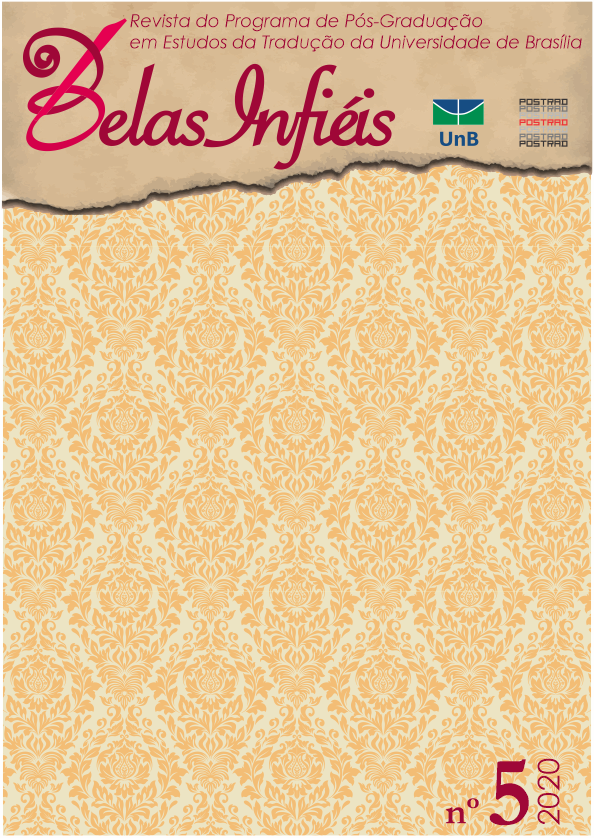“Hino às Musas” na Teogonia de Hesíodo (vv. 1-115)
DOI :
https://doi.org/10.26512/belasinfieis.v9.n5.2020.29613Mots-clés :
Hino à s Musas. Teogonia. Hesíodo. Tradução poética. Transcriação.Résumé
A maior parte das traduções existentes em português da Teogonia de Hesíodo primam por uma abordagem filológica, cuidando sobretudo do significado do texto grego em detrimento da materialidade dos significantes que o compõem. Em termos poundianos, geralmente prevalece a logopeia e a fanopeia, sem uma valorização da melopeia característica da produção poética grega antiga. A partir de breves reflexões sobre a possibilidade de uma nova “transcriação” da Teogonia (“transcriação” no sentido conferido por Haroldo de Campos a essa palavra), apresento uma nova tradução para o português dos 115 primeiros versos da Teogonia de Hesíodo, qual seja, do trecho conhecido entre helenistas como “Hino às Musas”: em minha tradução, buscarei soluções que levem em conta a totalidade do signo linguístico a fim de propiciar uma experiência poética desses versos.
Téléchargements
Références
CAMPOS, André Malta. Resenha de CAMPOS, Haroldo de; VIEIRA, Trajano. Mênis ”“ A Ira de Aquiles: Canto I da Ilíada de Homero. Edição bilíngue. São Paulo: Nova Alexandria, 1994. Letras Clássicas, São Paulo, n.2, p. 387-401, 1998. Disponível em: http://www.revistas.usp.br/letrasclassicas/article/view/73747. Acesso em: 3 fev. 2020.
CAMPOS, Haroldo de. Tradução e reconfiguração: O tradutor como transfingidor. In: TÁPIA, Marcelo; NÓBREGA, Thelma Médici (org.). Transcriação. São Paulo: Perspectiva, 2013. p. 109-130.
HÉSIODE. Théogonie: La naissance des dieux. Trad., prés. et notes de Annie Bonnafé. Précédé d'un essai de Jean-Pierre Vernant. Paris: Éditions Rivages, 1993. Tradução de: Θεογονία.
HESIODI. Theogonia. Opera et dies. Scutum. Edidit Friedrich Solmsen. Oxford: Oxford University Press, 1970. Tradução de: Θεογονία.
HESÃODO. Teogonia ”“ Trabalhos e Dias. Prefácio de Maria Helena da Rocha Pereira. Introdução, tradução e notas de Ana Elias Pinheiro e José Ribeiro Ferreira. Lisboa: Imprensa Nacional-Casa da Moeda, 2005. Tradução de: Θεογονία.
HESÃODO. Teogonia. Tradução e introdução de Christian Werner. São Paulo: Hedra, 2013. Tradução de: Θεογονία.
HESÃODO. Teogonia: a origem dos deuses. Estudo e tradução de Jaa Torrano. São Paulo: Iluminuras, 2. ed., 2012. Tradução de: Θεογονία.
JAKOBSON, Roman. Lingüística e poética. In: Lingüística e comunicação. Prefácio de Izidoro Blitzkein. Traduzido por: Izidoro Blitzkein e José Paulo Paes. São Paulo: Editora Cultrix, 1968. p. 118-162. Tradução de: Linguistics and Poetics (1960).
LORD, Albert. The Singer of Tales. New York: Atheneum, 1971.
OLIVA NETO, João Angelo. “Tradução Literária e Estudos Clássicos Brasileiros.” In: Ritmo e Sonoridade na Poesia Grega Antiga: Uma tradução comentada de 23 poemas, de Leonardo Antunes. São Paulo: Humanitas / FAPESP, 2011. p. 9-24.
PARRY, Milman. The making of homeric verse: The collected papers of Milman Parry. Adam Parry (ed.). Oxford: Clarendon Press, 1971.
PAZ, Octavio. Verso e prosa. In: Signos em rotação. Traduzido por: Sebastião Uchoa Leite. São Paulo: Editora Perspectiva, 1976. p. 11-36. Tradução de: Verso y prosa (1956).
POUND, Ezra. ABC of Reading. London; Boston: Faber and Faber, 1951.
SILVA, Rafael. Teogonia: a gênese de uma nova tradução. Revista Versalete, Curitiba, v. 2, n. 2, p. 133-144, 2014. Disponível em: http://www.revistaversalete.ufpr.br/edicoes/vol2-02/RafaelDaSilva.pdf. Acesso em: 7 set. 2020.
Téléchargements
Publié-e
Comment citer
Numéro
Rubrique
Licence
(c) Tous droits réservés CC BY 2020

Cette œuvre est sous licence Creative Commons Attribution 4.0 International.
Copyright Statement
Given the public access to this journal, the texts are free to use but requires the recognition of the original authorship and initial publication in this journal to be properly stated.
The journal allows the use of works published for non-commercial purposes, including the right to submit the work to publicly accessible databases. Published contributions are the sole and exclusive responsibility of the author(s).
- When submitting papers to be evaluated by the Belas Infiéis journal, the author(s):
- Declare that the contents of the contributions are original and of their original creation, being entirely responsible for their content if there is an objection by third parties.
- Claim to be aware that they should not commit academic plagiarism.
- Declare that the manuscript has not been published, completely or partially, in Portuguese or another language. If it is a translation it should be submitted to the Translated Articles section.
- Declare that the manuscript is not being evaluated by other journals.
- Declare that the manuscript was not submitted to another journal simultaneously.
- Commit(s) to inform the journal of any kind of error or inaccuracy in their contribution (published, in evaluation or in editing) and to collaborate with the editors to make due corrections of the article (when in evaluation or editing) or erratum/retraction (after publication).
- Declare that there is no conflict of interest regarding the published work.
- Authorize its release if it is accepted for publication without any kind of monetary compensation.
- Agree to assign non-exclusive rights to publication to the magazine, remaining free to make their contribution available in other media as long as the publication of the first version in Belas Infiéis magazine is mentioned. They also authorize Belas Infiéis to assign their texts for reproduction in content indexers, virtual libraries and similar platforms.
- Maintain copyright and grant the journal the right of first publication, the work being licensed under theCreative Commons Attribution License.
- Is/Are allowed and encouraged to publish and distribute their work online after the editorial process, which may increase the impact and citation of the published work.
- Authorize the editorial team to make textual adjustments and to adapt the article to the publication rules, when necessary.



















